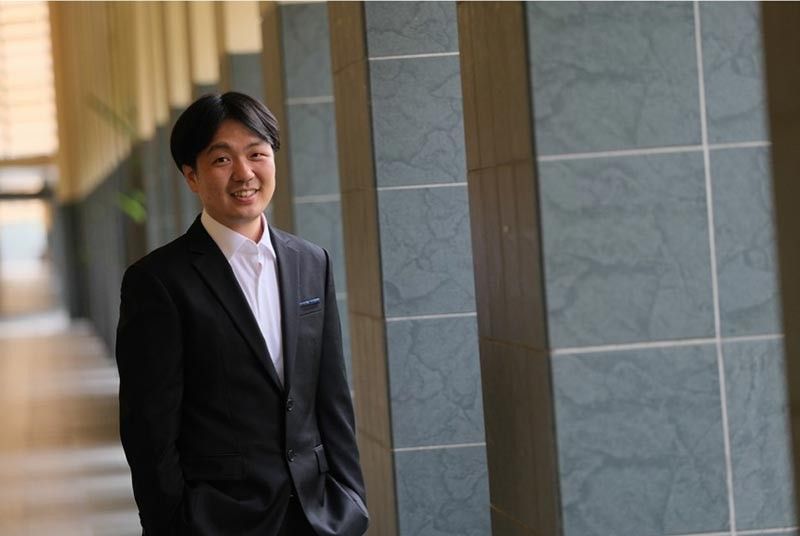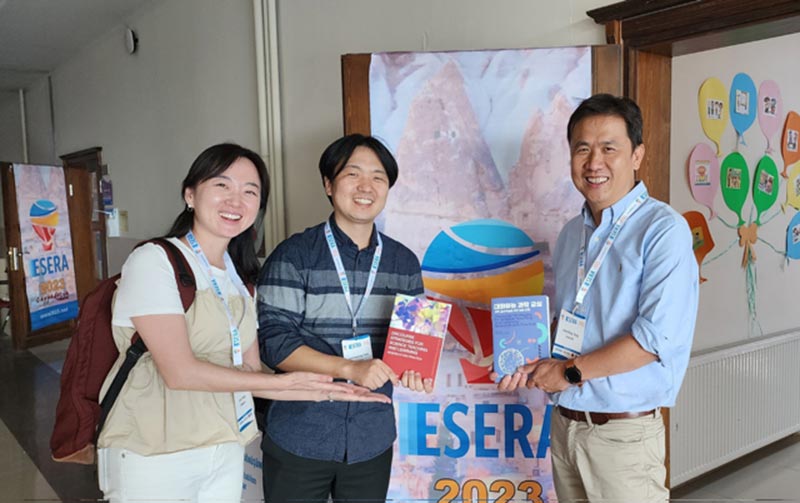A professor's passion: Enhancing multimodal meaning making in science education

MANILA, Philippines — “Pretty with a close look. Lovely with a long gaze. So are you.”
This poem from Glass Flowers by Korean poet Tae-Joo Ra had inspired Dr. Park Joonhyeong in his academic journey, leading him to better understand how students develop and represent scientific ideas in science classrooms from a multimodality perspective. This encompasses visual, verbal and embodied representations in constructing scientific explanations in an individual and a group setting.
“This poem resonates with how I feel when I observe my students over a period of time—gaining deeper insights and understanding by meticulously analyzing the data related to students in my research,” Dr. Park explains. He further elaborates that this understanding informs teachers on how to more effectively teach and guide students.
Dr. Park, an assistant professor at Natural Sciences and Science Education Academic Group (NSSE) in the National Institute of Education, Nanyang Technological University, Singapore (NIE NTU, Singapore), obtained his Doctor in Philosophy in Science Education specializing in Physics in South Korea before moving to Australia as a post-doctoral researcher.
Prior to joining NIE NTU, Singapore, Dr. Park taught physics and science educational theories to pre-service teachers and graduate students.
“As a child, I dreamt of becoming a scientist. This dream led me to become a science teacher. Subsequently, I became eager to understand how to teach science more effectively,” he recollects with a smile. “Recognizing the importance of science education research had inspired me to dedicate my life to this field.”
Innovations in education
Dr. Park’s primary research interest lies in multimodal representation in science classrooms. “The communicative nature of scientific ideas is inherently multimodal,” explains Dr. Park.
“When formulating scientific ideas that involve both generation and justification, and then communicating them, it’s imperative to involve multimodal representation. This is because verbal and written communication alone is limited in conveying multimodal meanings.”
It is this passion that prompted Dr. Park to explore further the multimodal discourse in science classrooms that supports students’ learning. He goes on to share that his research potentially facilitates the communicative aspect, which holds a pivotal role in science classrooms from cognitive, epistemic and social perspectives.
Achievements and challenges in research
One of Dr. Park’s notable achievements is the promotion of a drawing-to-learn approach in science classrooms in Singapore. “This approach serves as a potent strategy for enhancing multimodal discourse in these settings,” Dr. Park adds.
The intertextuality between verbal and visual modes, when supported by teachers, amplifies the richness of meaning-making in students’ scientific representation.
Undoubtedly, research comes with challenges too. With a laugh, Dr. Park recalls how he used to feel inadequate when it came to grasping linguistic theories, an area where he initially lacked expertise.
However, through collaboration and meticulous efforts, he eventually overcame this hurdle by translating works and engaging with experts to enhance his understanding of the theories.

Contribution to classroom learning
Among the research conducted by Dr. Park, one of his research findings had shown marked improvements in students’ learning and engagement in classrooms in South Korea, Australia and Singapore. Teachers involved in implementing multimodal strategies have given overwhelmingly positive feedback, recognizing the substantial benefits.
Dr. Park considers the insights gained from these experiences to be immensely satisfying. “Such insights spur me on to further investigate the underlying mechanisms of multimodal communication in science classrooms,” Dr. Park shares.
Reflecting on his journey as a researcher, Dr. Park felt that, in hindsight, it might have been beneficial to have more discussions with a broader spectrum of teachers and students to enhance the generalizability of his findings.
“Given that this research focuses on teacher-student and student-student interactions, a deeper exploration of various multimodal interactions is essential,” Dr. Park explains.
The future of science education, artificial intelligence
With the growing interest in the utilization of artificial intelligence (AI) in the context of guided scientific inquiry and the significant role it plays in communicating ideas, Dr. Park believes that there is room for future research to study the potential of generative AI as a co-communicator in science classrooms.
Do you aspire to expand your knowledge through research in a progressive and advanced environment like NIE? Applications for the August 2024 intake are open until Jan. 31, 2024 for research programs. For more information, visit www.nie.edu.sg/aug2024.
To find out more about Dr. Park Joonhyeong and the research by the Natural Sciences and Science Education Academic Group at NIE, please visit https://www.ntu.edu.sg/nie/about-us/academic-groups/natural-sciences-and-science-education
The National Institute of Education (NIE) is an autonomous institute under the Nanyang Technological University (NTU), Singapore. It has been consistently ranked among the Top 30 educational institutions in the world and the Top five in Asia by the Quacquarelli Symonds (QS) ranking.
Editor’s Note: This press release is sponsored by the National Institute of Education of Nanyang Technological University (NTU), Singapore. It is published by the Advertising Content Team that is independent from our Editorial Newsroom.



















